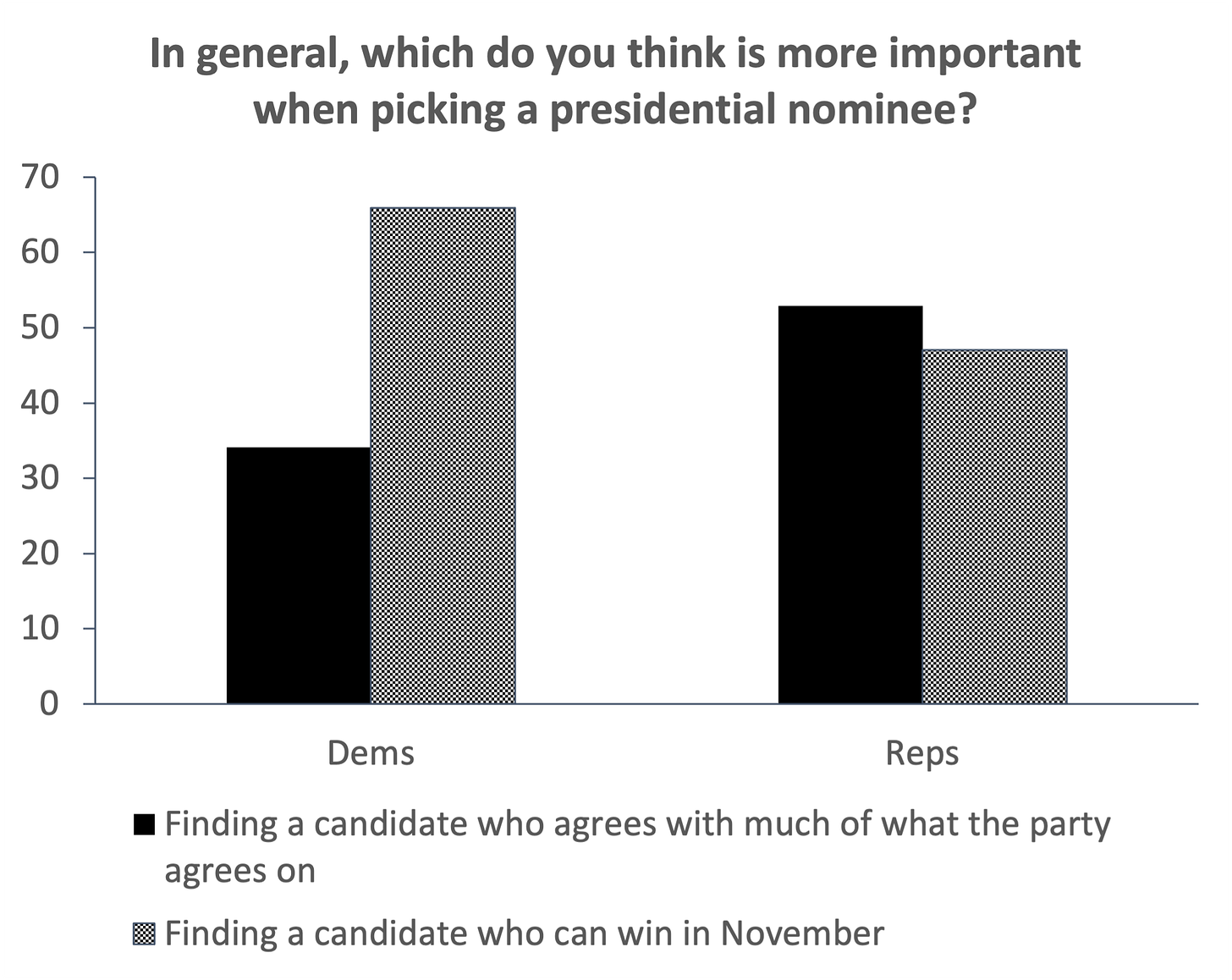Democrats, Republicans, and Electability
The two parties have very different priorities when it comes to picking nominees
One of the narratives coming out of last year’s midterm elections is that Republicans underperformed because they nominated poor candidates. For example, if you focus on just the Senate races in Pennsylvania, Arizona, and Georgia, it’s reasonable to think that Republicans would be in control of the Senate today if they had nominated candidates other than Mehmet Oz, Blake Masters, and Herschel Walker. And their weaknesses as candidates seemed pretty obvious ahead of time. So, why didn’t Republicans do that?
It’s a particularly interesting question when you look at Democrats’ recent behavior. As I argued in my book Learning from Loss, Democrats massively (and atypically) prioritized electability going into 2020, casting aside a number of young, energetic, progressive candidates who were women, people of color, LGBTQ, etc., and went with Joe Biden for the sole reason that they thought he could beat Trump. And Democrats continue to clear the field for strong candidates.
Are the parties really treating this question differently? To get at this, I conducted a survey of county party chairs in early February 2023. One of the questions I asked them was what sort of candidate they generally prefer to nominate: one who agrees with much of what the party agrees on, or one who can win a general election.
This is a basic question about electability. And while electability is itself a tricky concept, asking people to assess who they think other people will vote for in a future election against an undetermined opponent, and is subject to all sorts of cognitive biases, the question here is simply trying to gauge how much people care about electability versus ideological fealty to the party.
The results here are pretty striking:
Democrats slightly preferred a candidate who can win over a candidate they agree with, by a factor of 51-49. Republicans, however, overwhelmingly preferred a candidate they agree with, by 63 to 37.
I also asked these chairs to focus just on presidential nominees. Here’s what they had to say:
It’s the same basic pattern. Democrats in this case overwhelmingly prefer presidential nominees who they think can win (66-34), while Republicans narrowly prefer a candidate they agree with (53-47).
These are pretty striking differences across parties. And there are a few ways of interpreting just what’s going on here:
Republicans care more about ideology than Democrats do. That’s consistent with what Matt Grossmann and Dave Hopkins wrote about Republicans being the more ideologically oriented party. And it’s supported by some findings by David Broockman, Nicholas Carnes, Melody Crowder-Meyer, and Chris Skovron showing that local Republican leaders are far more interested in nominating extremists than Democratic leaders are.
Notably, both parties have pretty extreme wings, but the progressives on the Democratic side have been much more willing to play ball with moderates in order to win elections than the conservatives have been within their party. The progressive left definitely had some beefs with Nancy Pelosi, but they weren’t about to publicly humiliate her for a week the way the conservative right did to Kevin McCarthy.
Republicans are less convinced than Democrats that electability is a thing. As I noted previously, Democrats and Republicans have very different views of the past half century of presidential elections. Democrats saw George McGovern getting trounced in 1972, but the party recovering by nominating the more moderate Jimmy Carter in 1976. They saw their party losing a string of elections in the 1980s, purportedly for nominating candidates who were too extreme, but then winning in 1992 with a more moderate Bill Clinton. They believe Al Gore and Hillary Clinton were seen as too extreme, but Biden won by being more moderate. That is, Democrats believe they win when they moderate.
Republicans, conversely, were told that Ronald Reagan was too extreme, but he won. They were told Donald Trump was unelectable, which he was until he got elected. They were told they had to moderate with candidates like John McCain and Mitt Romney in order to win, but those guys lost. So Republicans come away with the lesson that they win when they stand up for what they believe.
Neither side is obviously wrong. But these two different beliefs will produce very different behavior.
I’m not sure which of these explanations is more correct, but I’ll be working on that puzzle in the months to come. And watch for more survey results here!







JOIN LOCAL REPUBLICANS TO BAN JABS
https://covidandvaxfaqs.substack.com/p/join-local-republicans-to-ban-jabs
What if it has something to do with the alternatives?
What if those Democrats are currently prioritizing electability because they're playing defense against something they perceive to be truly unacceptable? Negative partisanship has been increasing moderately over the last 3 decades, but I think the number of us political scientists saying "umm, the GOP is something different" since 2016 should be taken into account. The Democrats might just be really terrified of the alternative.
While I think there's something to this, I can't think of a good way of testing it historically. So, I'm very cautious about drawing this conclusion, because it leaves me with a "how do you explain anything before 2014" problem.